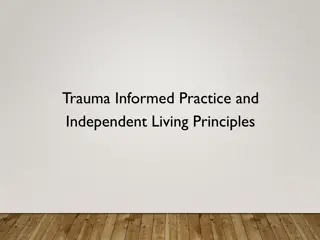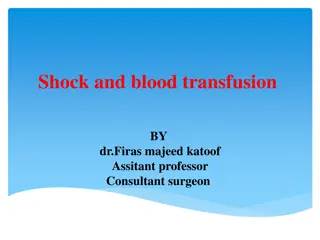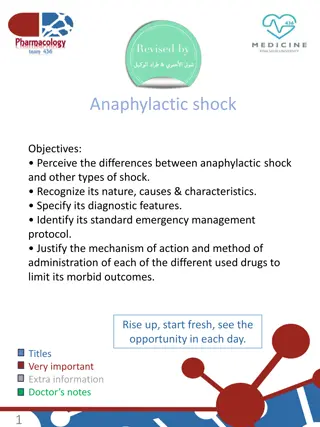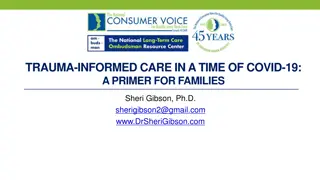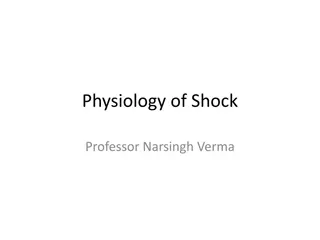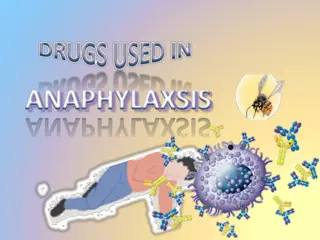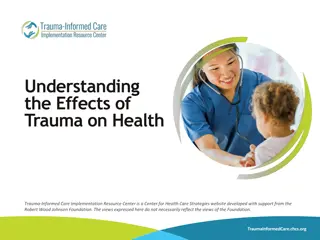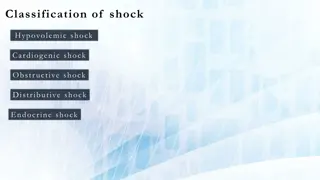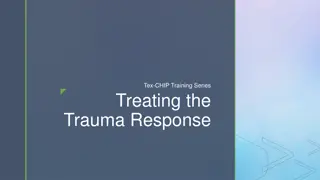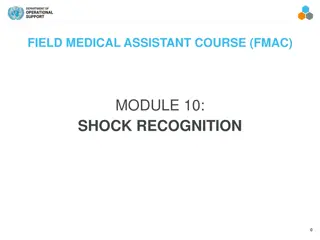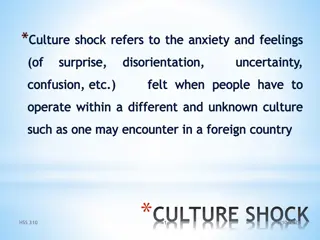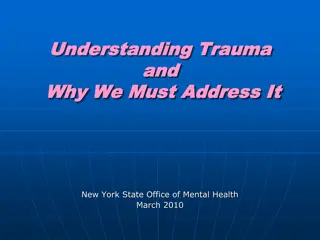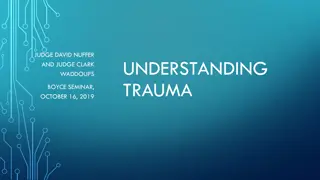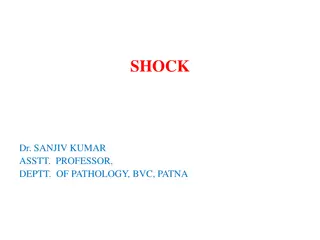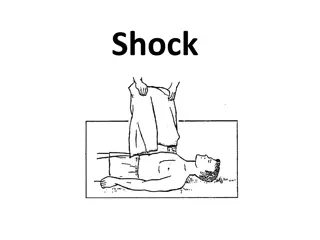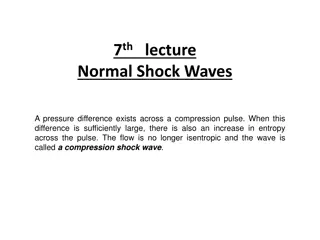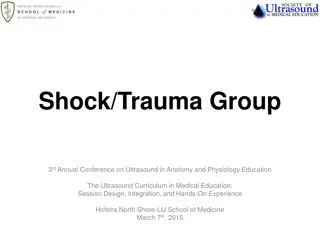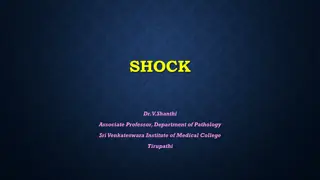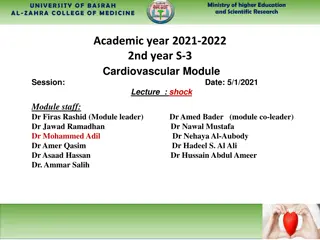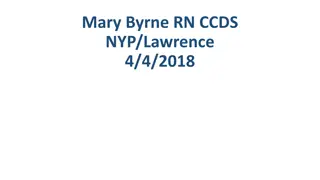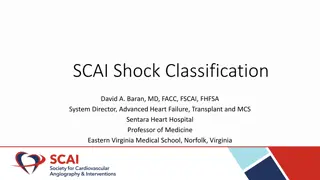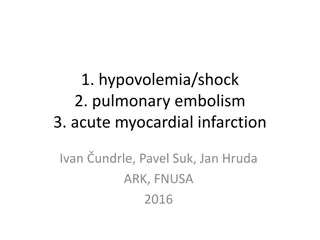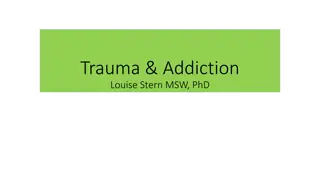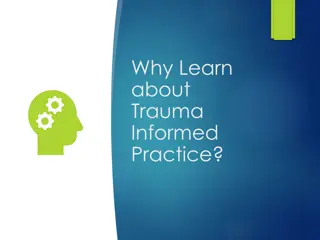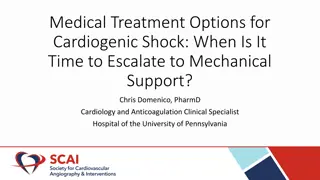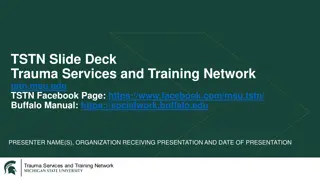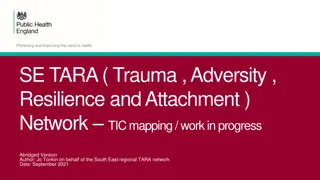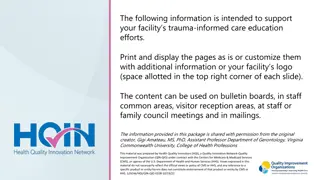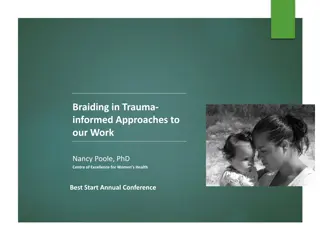Understanding OIG Audits for Trauma Payment Claims
Delve into the intricacies of OIG reviews of trauma payment claims, focusing on the potential impact on Medicare payments for trauma centers and providers. Learn about key issues investigated by the OIG, such as non-designated/verified trauma centers, using revenue codes, trauma team upgrades/downgr
1 views • 28 slides
Understanding Trauma-Informed Techniques on College Campuses
Exploring trauma and its impact on individuals, particularly college students, this presentation delves into recognizing trauma, signs of trauma on campuses, and the role of campus safety and police in addressing and supporting those affected by trauma. Highlighting the importance of empathy, unders
1 views • 22 slides
Building a Trauma-Informed Workplace for Equitable Employment: USDA Symposium 2023
Explore the imperative of creating trauma-informed workplaces at the National Disability Employment Awareness Month Symposium hosted by USDA Target Center. The event sheds light on the prevalence of workplace trauma, its impact on mental health, and steps to advance access and equity. Gain insights
2 views • 36 slides
Understanding Shock: Causes, Symptoms, and Stages
Shock is a critical condition caused by an imbalance between cellular oxygen supply and demand, leading to organ dysfunction. Compensatory responses include increased heart rate, vasoconstriction, and hormonal adjustments. Recognizable features of shock include tachycardia, hypotension, cool clammy
3 views • 27 slides
Understanding Trauma-Informed Practice for Independent Living
Explore the dimensions and types of trauma, including single incident, complex, and developmental trauma, as well as intergenerational and historical trauma. Learn how coping patterns can be passed down through generations and discover the importance of Trauma-Informed Practice (TIP) to support indi
5 views • 15 slides
Understanding Trauma-Informed Safeguarding Practices
Trauma is the result of harmful or life-threatening events, impacting an individual's well-being. Trauma-informed practice acknowledges the effects of trauma on neurological, biological, and psychological development. The body responds to stress with physiological changes, including fight, flight, f
3 views • 8 slides
Understanding Shock and Blood Transfusion in Surgery
Shock is a state of low tissue perfusion leading to metabolic changes like anaerobic metabolism and acidosis. As cellular hypoxia progresses, immune and coagulation responses are activated, impacting cardiovascular, respiratory, renal, and endocrine systems. Shock can be classified into hypovolaemic
0 views • 38 slides
Understanding Anaphylactic Shock: Diagnosis, Management, and Drug Therapy
Anaphylactic shock is a life-threatening allergic reaction that can lead to shock and airway swelling. Learn about the differences from other types of shock, diagnostic features, emergency management protocol, and drug therapy to limit morbid outcomes. Discover the nature, causes, and characteristic
1 views • 12 slides
Understanding the Biochemistry of Shock
Shock is a critical condition where circulation fails to meet cells' nutritional needs, leading to a range of potentially life-threatening events. Primary and secondary types of shock are discussed, emphasizing the significant impact on oxygen supply and demand at the cellular level. The effects of
0 views • 17 slides
Understanding Trauma-Informed Care During COVID-19
This primer by Dr. Sheri Gibson explores trauma-informed care in the context of COVID-19, emphasizing the multifaceted individual responses to trauma. It delves into the elements of trauma-informed care, the prevalence of trauma, and provides insights on recognizing and addressing trauma amidst the
0 views • 39 slides
Understanding the Physiology of Shock by Professor Narsingh Verma
Shock is a critical condition resulting from poor tissue perfusion and impaired cellular metabolism. Various definitions describe it as inadequate delivery of oxygen and nutrients, leading to reversible or irreversible cellular injury. Different types of shock, such as hypovolemic shock, have common
0 views • 24 slides
Understanding Anaphylaxis and Anaphylactic Shock
Anaphylaxis is a severe allergic reaction affecting the entire body, while anaphylactic shock is a life-threatening manifestation of this reaction involving shock and airway swelling. This comprehensive material delves into the nature, causes, symptoms, diagnostic features, emergency management prot
0 views • 18 slides
Understanding the Effects of Trauma on Health: Insights from Trauma-Informed Care Implementation
Individual trauma and adverse childhood experiences can have lasting effects on mental, physical, social, and emotional well-being. The Trauma-Informed Care Implementation Resource Center provides valuable insights on defining trauma, examples of traumatic events, prevalence statistics, and types of
0 views • 11 slides
Overview of Shock Classifications and Causes
Shock is classified into different types such as Hypovolemic, Cardiogenic, Obstructive, Distributive, and Endocrine shock. Hypovolemic shock results from fluid loss, while Cardiogenic shock is due to heart failure. Obstructive shock occurs from mechanical obstructions, whereas Distributive shock is
1 views • 11 slides
Understanding Trauma Response and Treatment in the US
Trauma is prevalent in the US, with unresolved reactions affecting development and relationships. Effective treatment like Cognitive Processing Therapy (CPT) is vital for well-being. Sources of trauma include threats to the body, environmental events, and relational trauma. Responses to trauma vary
0 views • 18 slides
Understanding Shock: Etiology, Pathophysiology, Diagnosis, and Management Priorities
Shock, a condition where blood circulation fails to deliver sufficient oxygen, is a common cause of death in surgical patients. Recognizing shock early is crucial to prevent irreversible tissue damage and organ failure. It is vital to understand the various aspects such as etiology, pathophysiology,
2 views • 55 slides
Tactical Field Care - Shock Recognition and Management
Tactical Field Care emphasizes the importance of shock recognition and prompt intervention to prevent casualties on the battlefield. Understanding the signs, symptoms, and management steps of shock, particularly in trauma cases with life-threatening bleeding, is crucial for medical personnel. This m
0 views • 18 slides
Understanding Culture Shock: Phases, Symptoms, and Coping Strategies
Culture shock is the anxiety and disorientation experienced when adapting to a new and unfamiliar culture. This phenomenon involves various stages, from the honeymoon phase to readjustment and reverse culture shock. Symptoms of culture shock can be physiologically, psychologically, and socially base
1 views • 11 slides
Understanding Trauma: Why It Must Be Addressed - Insights from New York State Office of Mental Health
This presentation delves into the critical topic of trauma, defining it, exploring its prevalence, implications, and the differences between trauma-informed and trauma-insensitive systems. It emphasizes understanding trauma's impact, identifying core organizational elements for addressing it, and as
0 views • 36 slides
Understanding Trauma: Causes, Effects, and Healing
Explore the complexities of trauma through insights on the causes, effects, and healing processes. Delve into the impact of PTSD on the brain's attention patterns, common triggers of trauma, and the profound effects trauma can have on individuals. Discover how trauma manifests in hypervigilance, mem
0 views • 20 slides
Understanding Shock: Types, Mechanisms, and Causes by Dr. Sanjiv Kumar
Shock, a critical medical emergency, results from the failure of the circulatory system to adequately perfuse vital organs. This comprehensive overview delves into the different types of shock such as cardiogenic, hypovolemic, septic/endotoxic, neurogenic, and anaphylactic shock. Each type is explor
0 views • 12 slides
Understanding Shock: Types, Classification, and Clinical Course
Shock is a critical state where the circulatory system fails to adequately perfuse cells, leading to oxygen and nutrient delivery reduction. It can be classified into hypovolemic, cardiogenic, and distributive types, with septic shock caused by microbial infections. Shock progresses through stages f
0 views • 8 slides
Understanding Shock: Definitions, Types, and Management Principles
Shock is a condition characterized by inadequate tissue perfusion, leading to a range of systemic effects. This article outlines the definitions, signs and symptoms, general principles of management, and specific types of shock, including hypovolemic, cardiogenic, neurogenic, anaphylactic, and septi
0 views • 20 slides
Understanding Normal Shock Waves in Gas Dynamics
In gas dynamics, normal shock waves occur when there is a significant pressure difference across a compression pulse, leading to increased entropy. This results in non-isentropic flow known as compression shock waves. The formation of compression and expansion waves can be likened to piston movement
0 views • 16 slides
Ultrasound Curriculum in Medical Education: Shock/Trauma Group Conference 2015
Development of a longitudinal ultrasound module focusing on the pathophysiology of shock for educational purposes, aiming to enhance knowledge and skills in the evaluation and management of shock patients. The curriculum includes learning objectives covering shock classifications, differential diagn
0 views • 10 slides
Dynamic Calibration of Pressure Transducers in a Shock Tube
This study focuses on the dynamic calibration of pressure transducers in a shock tube to understand boundary layer stability and transition. By creating a shock to impact a Kulite pressure transducer mounted at the end of the tube, researchers aim to determine key parameters such as resonance, dampi
0 views • 11 slides
Understanding Shock: Types, Mechanisms, and Pathophysiology
Shock, a state of systemic hypotension resulting in impaired tissue perfusion and cellular hypoxia, has various types such as cardiogenic, hypovolemic, septic, neurogenic, and anaphylactic shock. Each type has different mechanisms and causes, leading to decreased cardiac output and multiorgan failur
0 views • 45 slides
Understanding Shock in Medical Science: Definitions, Classification, and Management
Shock is a critical condition caused by poor tissue perfusion leading to impaired cellular metabolism. This article discusses the definition of shock, its classification including septic, anaphylactic, cardiogenic, hypovolemic, and neurogenic shock, along with the clinical manifestations and hemodyn
0 views • 19 slides
Understanding Postoperative Shock and Respiratory Failure
Postoperative shock refers to different types of shock that may occur after surgery, such as hypovolemic, cardiogenic, or septic shock. It is crucial to recognize the signs and symptoms of shock early to prevent irreversible consequences. On the other hand, respiratory failure can be acute or chroni
0 views • 8 slides
Understanding the SCAI Shock Classification System
The SCAI Shock Classification, led by Dr. David A. Baran, introduces a new definition for cardiogenic shock, emphasizing simplicity, adaptability, and improved communication among healthcare providers. It aims to enhance patient assessment, reclassification, and research outcomes, emphasizing a mult
0 views • 27 slides
Understanding Shock: Causes, Phases, and Pathophysiology
This comprehensive guide delves into the various aspects of shock, including hypovolemia, pulmonary embolism, and acute myocardial infarction. It covers the general concept of shock, circulatory failure, phases of shock, pathophysiology, manifestations, diagnostic approaches, and complications such
0 views • 52 slides
Understanding Trauma, Addiction, and Their Interconnection
Experiencing trauma does not guarantee addiction, but research links trauma to addictive behaviors. Trauma, whether single, complex, or historical, can lead to substance use as a coping mechanism. Psychological trauma like ACEs, childhood maltreatment, and PTSD are significant factors. Co-morbidity
0 views • 12 slides
Understanding Trauma: Key Elements and Neurobiological Impact
Trauma-informed practice involves being aware of trauma's presence, understanding its effects on physical and emotional well-being, and working with trauma symptoms constructively. Trauma can arise from direct exposure, witnessing, or indirect experiences, affecting memory encoding and retrieval. Th
0 views • 23 slides
Trauma-Informed Supervision Practices and Principles
Explore the concept of trauma-informed care, its principles, and core schemas distorted by trauma. Learn how trauma-informed supervision supports staff experiencing trauma, promotes resiliency, and addresses secondary trauma effects. Discover guiding questions for meaningful conversations and provid
0 views • 17 slides
Treatment Options for Cardiogenic Shock: Pharmaceutical and Mechanical Support
This article discusses pharmaceutical treatment options for cardiogenic shock, including milrinone, dobutamine, and dopamine. It also explores criteria for escalating treatment to mechanical support in cases of severe shock. The comparison between milrinone and dobutamine in supporting patients awai
0 views • 19 slides
Understanding Trauma: Definitions, Prevalence, and Impacts
This presentation explores trauma basics, including definitions, ACES, risk and protective factors, resiliency, PTSD, cultural awareness, stereotypes, stigma, and trauma-informed approaches. It also delves into the prevalence of trauma, highlighting statistics on traumatic event exposure among colle
0 views • 7 slides
Understanding Trauma-Informed Care (TIC) and Resilience in the SE TARA Network
This work-in-progress document discusses the aims and objectives of the SE TARA Network in establishing a common language and approach to Trauma-Informed Care (TIC). It highlights strengths and limitations of unifying TIC responses, defines trauma and trauma-informed approaches, and outlines key pri
0 views • 10 slides
Understanding Trauma and Implementing Trauma-Informed Care
Explore the concepts of trauma, trauma-informed care, and the impact of traumagenic experiences on individuals with this comprehensive educational package. Learn about the sources of trauma, nervous system responses, and how to create a culture of trauma-informed care in your facility. Utilize the p
0 views • 7 slides
Understanding Trauma and Trauma-Informed Approaches in Practice
Exploring trauma and trauma-informed practice through a presentation by Nancy Poole, PhD, at the Best Start Annual Conference. The session delves into trauma's impact, the concept of historical trauma, and the integration of Indigenous and Western knowledge systems in research. It also discusses the
0 views • 46 slides
Understanding Traffic Flow Theory and Shock Waves in Transportation Engineering
Explore fundamental principles of traffic flow, applications of traffic flow theory, shock waves in traffic streams, and types of shock waves in transportation engineering. Learn about determining lane lengths, estimating delays, and analyzing shock wave behaviors in various traffic scenarios. Delve
0 views • 18 slides




